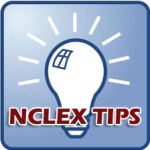Here are some valuable tips in answering NCLEX Questions. Study each points and apply it in answering your NCLEX practice tests to exercise your exam muscles.
Multiple Choice NCLEX Questions
The question has different parts:
• the case (also called scenario) – the description of the client and what is happening
• the stem – the part of the question that asks
• the correct response – correct option
• distracters – incorrect but feasible options
Key Words
A very important skill for the NCLEX testtaker is the ability to read the nclex question carefully and decipher the key elements in each question. Every question has keywords. Keywords relate to the client; to the problem; and to specific parts of the problem.
Client
Factors like age, sex, and marital status may be important. When a child’s age is stated it usually is highly relevant to the correct answer. Vital signs differ with age. Preoperative teaching methods vary with age. Appropriate toys and diversional activities differ with age. Always pay more attention to the age of a patient when it is stated. Also take into mind who is the client for a certain question. Meaning, who is the focus of the NCLEX question. The client may be a sick person, or it could be the relative of the identified sick person, or even a staff.
Problem/Behavior
The problem may be a disease, a symptom or a behavior.
Details of the Problem
• Is the stem asking for nursing actions or client symptoms or family responses?
• Does the question ask about a specific aspect of nursing care assessment, planning, implementation, evaluation?
• Does the question ask details relevant to a specific symptom or behavior the client displays?
• Is there added information about the client or the problem that is relevant?
Priority Setting
• “What action takes priority?”
• “What should the nurse do first?”
• “What should the nurse do initially?”
• “What is essential for the nurse to do?”
Physiologic needs are first, then followed by safety, then love and belonging, self-esteem and self-actualization.
The first step of the nursing process is assessment! When the stem asks for the initial nursing action, always find if there is a relevant assessment option. The nurse will lake an action only when there is adequate data to act. Call the physician only when there is no nursing action that must be taken first. The stem of the question may ask for a nursing action and the correct option may be to assess.
When the stem of the question asks what is essential for the nurse to do, think safety. Remember many of the NCLEX questions are safety questions.
What is the Time Frame?
Whenever a specific time frame is stated in a question it is very important. Pay attention to it. Time related words may be like early or late in relation to symptoms, preoperative or post operative, care on the day of surgery or later post-operative care.
Repeated Words
Words from the question are repeated in the answer. Sometime the same word or a synonym will be in both the question and the correct option.
Opposites
When two answers are opposite such as high blood pressure and low blood pressure or increase the drip rate and stop the IV, or turn on the right side and turn on the left side, the correct answer may be one of the two.
Same Answer
If two or three answers say the same thing in different words none can be correct. If the answers are too alike, then neither one is correct.
Odd Answer Wins
The answer that is different from the others may be the correct answer. It may be the longest or the shortest or simply very different in content or style.
Umbrella Answer
One answer includes the others. There may be more than one correct answer. One answer is better than all the others because it includes them.
Answers containing universal or absolute words are very apt to be incorrect. Very little in life or nursing is always correct or incorrect. Answers stated in absolute terms should be looked at with great caution.
“Deadly”
all every total
nothing always each
only any nobody
never none
“Dangerous”
main chief avoid primarily
major shall inevitable eliminate
rarely impossible too
“Safe”
usually almost f requently probably potentially
may sometimes partial some might
should few essentially generally occasionally
nearly maybe could commonly average
seldom often normally
I hope you learn a lot from this NCLEX Questions Tips. Apply these learnings on your exam and pass the NCLEX on the first try!
